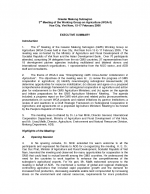
Third Meeting of GMS Working Group on Agriculture (WGA-3): Summary of Proceedings
The Third Meeting of the GMS Working Group on Agriculture was held in Hue City, Viet Nam on 15-17 February 2006.
Agriculture is the backbone of the Greater Mekong Subregion’s economies. With over 60% of the subregion’s 340 million inhabitants engaged in small-scale agriculture, it directly supports the livelihoods of nearly 200 million people.
The Working Group on Agriculture (WGA) has been working toward the implementation of priority projects under the Core Agriculture Support Program.
Agriculture is the cornerstone of many families’ livelihoods, however it is also exacting a toll on the environment, contributing to forest and biodiversity loss, water pollution and shortages, soil degradation, and greenhouse gas emissions.
People and governments in the Greater Mekong Subregion (GMS) are working to develop agricultural practices that simultaneously conserve land and water resources, while at the same time increasing the productivity and profitability of agriculture, particularly for small-scale farmers.
The GMS Economic Cooperation Program Strategic Framework 2030 (GMS-2030), endorsed and adopted at the 7th GMS Summit of Leaders in September 2021 to provide a new setting for the development of this subregion for the next decade, notes that in the agriculture sector, GMS-2030 will promote higher food safety and quality standards for expanding exports, for which an alignment of policies and standards will be required in the subregion. GMS-2030 will encourage climate- and environment-friendly production practices along the value chain, as well as sustain natural assets with a focus on small-scale farmers and micro, small, and medium-sized agro-enterprises. Given that COVID-19 has adversely impacted agricultural supply chains, GMS-2030 will support food security response and recovery efforts in the medium and long terms.
The GMS Sustainable Agriculture and Food Security Program (GMS SAFSP), implemented in 2019,has been designed to assist the GMS countries to tackle key climate change challenges to their agricultural sectors.Its three themes are: (i) climate-friendly, inclusive, and gender responsive agri-food value chains and agribusiness; (ii) climate-adaptive agriculture in the context of water-energy food nexus; and (iii) harmonized crop and livestock safety and quality systems.
The SAFSP was prepared in response to the recommendations of GMS agriculture ministers in 2017. They expressed a joint vision of promoting the GMS as a leading supplier of safe, quality and climate-friendly agri-food products. Achieving this vision depends on overcoming multiple barriers along the agrifood value chains. The ministers endorsed the Strategy for Promoting Safe and Environment Friendly Agro-Based Value Chains in the GMS at the 2nd GMS Agriculture Ministers' Meeting in Siem Reap, Cambodia on 6-8 September 2017. The Strategy aims to promote safe and environment-friendly agriculture products, and a plan to strengthen value chain integration, involving smallholder farmers, rural women, as well as small and medium-sized agro-enterprises.
The GMS SAFSP builds on the achievements of the GMS Core Agriculture Support Program (CASP) phase I (2006-2012) and phase II (2011-2020).
Related
• Strategy for Promoting Safe and Environment-Friendly Agro-Based Value Chains and Siem Reap Action Plan, 2018-2022
• Core Agriculture Support Program Phase II (2011-2015)
• Core Agriculture Support Program Phase I (2006-2010)
• GMS Sustainable Agriculture and Food Security Program Newsletter
• Working Group on Agriculture (WGA)
Focal Persons at the Asian Development Bank
Srinivasan Ancha
Climate Change, Resilience, and Environment Cluster
Climate Change and Sustainable Development Department
Criselda Rufino
Agriculture, Food, Nature, and Rural Development Sector Office
Sectors Group
Other Concerned Staff & Consultants
Asadullah Sumbal
Regional Cooperation and Integration Unit
Southeast Asia Department
Rafaelita Jamon
Regional Cooperation and Integration Unit
Southeast Asia Department/GMS Secretariat
Send inquiries to GMS CCESP Secretariat and GMS Secretariat.

The Third Meeting of the GMS Working Group on Agriculture was held in Hue City, Viet Nam on 15-17 February 2006.

This publication outlines the GMS Economic Cooperation Program (GMS Program) which was initiated in 1992 with the support of ADB. It aims to promote economic cooperation among Cambodia, People's Republic of China (PRC), Lao People's Democratic Republic (Lao PDR), Myanmar, Thailand, and Viet Nam.
The GMS Program covers nine priority sectors: transportation, telecommunications, energy, environment, human resource development, trade, investment, tourism, and agriculture.
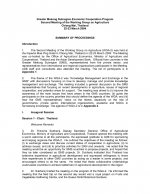
The Second Meeting of the Working Group on Agriculture was held in Chiang Mai, Thailand on 22-23 March 2004.
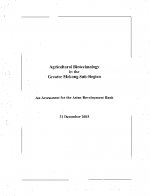
This publication summarizes the proceedings of the GMS workshop on agricultural biotechnology held in Bangkok, Thailand in December 2003.
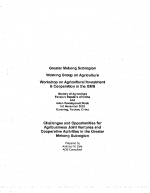
This publication summarizes the proceedings of the GMS workshop on agricultural investment and cooperation in the Greater Mekong Subregion, held in Kunming, Yunnan, People's Republic of China, on 3-5 November 2003.
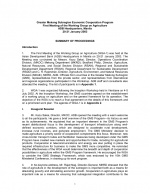
This is the summary of proceedings from the First Meeting of the Working Group on Agriculture (WGA-1) held at the Asian Development Bank Headquarters in Manila on 20-21 January 2003.
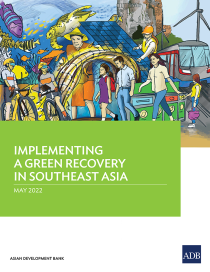
This report explains why Southeast Asian countries need to design pandemic recovery policies that hit both ambitious socioeconomic and environmental goals.